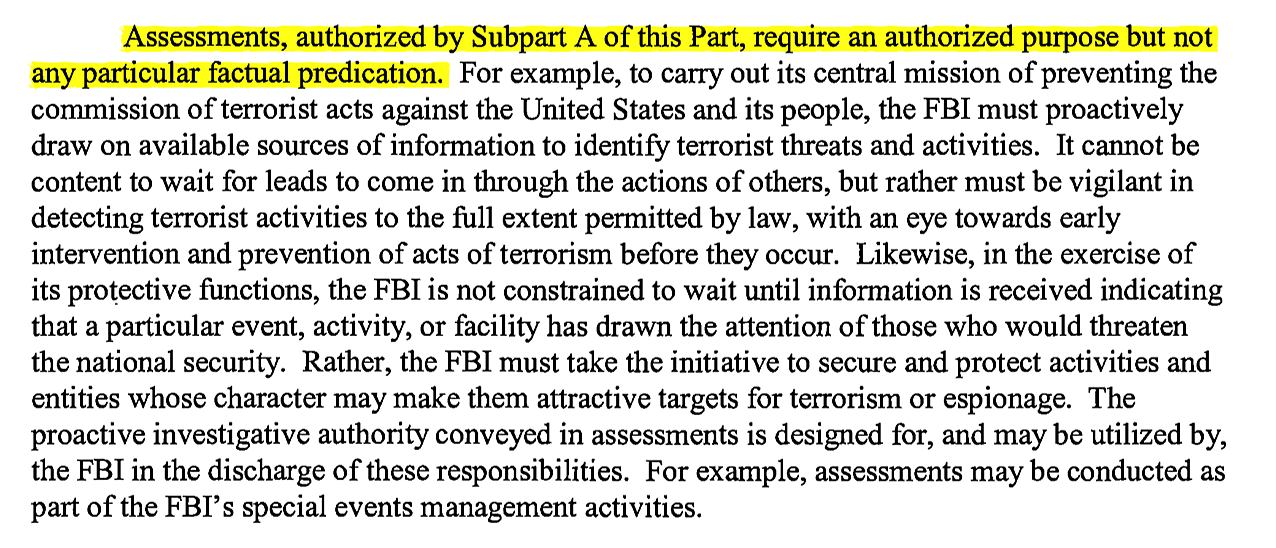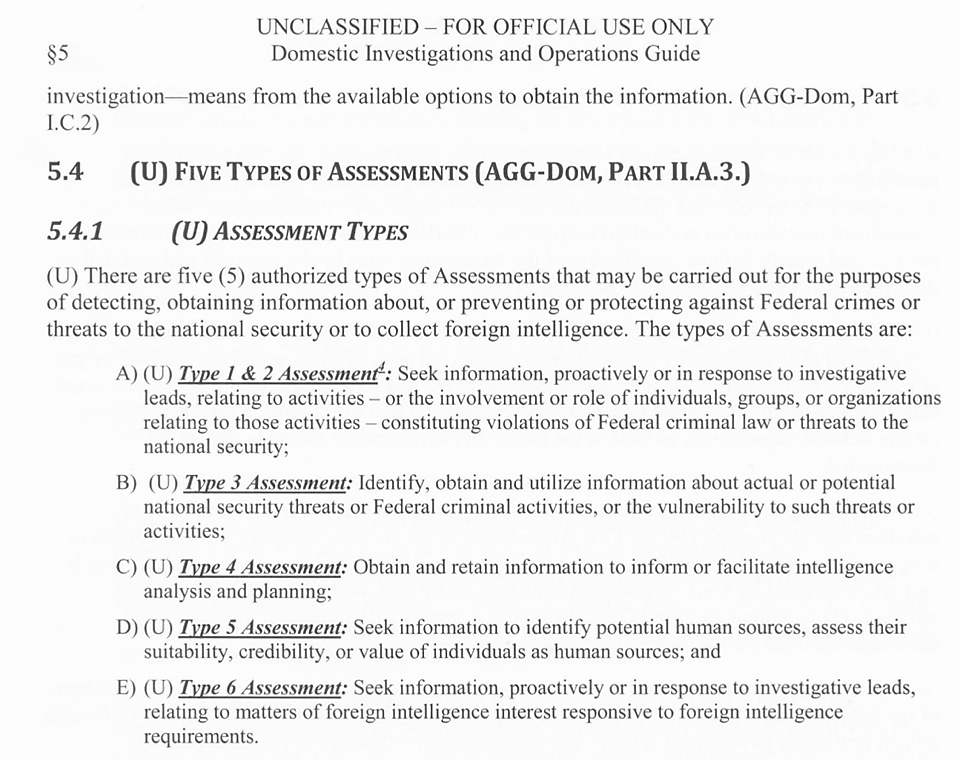When is an FBI investigation not, according to the FBI, an investigation? When the non-investigation investigation is categorized, per the FBI Domestic Investigations and Operations Guide (DIOG), as an “Assessment”–a bureaucratic exercise in legerdemain made possible by the 2008 rewrite of the Attorney General’s Guidelines on Domestic FBI Operations. Here’s the relevant paragraph on “Assessments” from the AG Guidelines (p. 17):
You read that correctly: the FBI can open an “Assessment” on any individual or organization without a criminal predicate.
And as a Brennan Center fact sheet on FBI investigation types notes, by opening an “Assessment”, the FBI can “recruit informants to monitor the subject, question people without revealing the agent’s identity, search commercial and government databases, and conduct physical surveillance of a person’s public movements.”
There are also at least five different kinds of “Assessments”, as this extract from the DIOG lays out:
Notice the broad powers granted to investigate persons and organizations, the authorization to collect and retain data, etc. All without having hard evidence that someone has or is about to commit an actual federal crime. This is authority to conduct domestic surveillance “fishing expeditions” on people or groups engaged in constitutionally protected speech and advocacy.
Through the Freedom of Information Act (FOIA), Cato has obtained examples of “Assessments” opened on groups like the Massachusetts-base Muslim Justice League (MJL), the Albany, New York chapter of the League of Women Voters, and the Denver, Colorado chapter of the International Rescue Committee (IRC). In the cases of MJL and the IRC, the FBI’s focus was on trying to convince the groups that the Bureau’s activities were of an “outreach” nature, designed to assist MJL and IRC in identifying alleged, potential terrorists in their communities–in this case communities involving specific religious or ethnic minorities.
The word for this is “profiling”–an inherently discriminatory and ineffectual practice that had, predictably, the exact opposite effect the Bureau intended, as you can see by looking at the reaction of IRC clients as relayed to the Bureau by IRC staff.
In the case of the Albany, NY LWV chapter, the FBI Albany Field Office agents were literally trolling for “public corruption” business; the LWV had not contacted the FBI with any allegations of corrupt acts by New York state legislators.
Just how many times do Bureau agents open “Assessments”? When the New York Times asked that question via FOIA, the answer it got was astounding.
As former FBI Special Agent and Brennan Center Fellow Mike German noted in 2017, “From 2009 to 2011, the first two years the [Attorney General Michael] Mukasey guidelines were in place, the FBI opened over 82,325 assessments, of which only 3,315 found information that warranted opening preliminary or full investigations. This data is even more astonishing given the low evidentiary standard needed to open a preliminary investigation, which can last up to 18 months.”
In attempt to get updated numbers on FBI “Assessments” by type, Cato filed a FOIA with the FBI in October 2020. The FBI denied the request, claiming it was “too broad” in scope. The Department of Justice’s Office of Information Policy (OIP) upheld the administrative denial on February 25, 2021, claiming that “Your request is not reasonably described because you did not characterize the records sought in such a way that they could be located without searching through millions of records.”
OIP’s claim is, of course, nonsense. The FBI’s SENTINEL case management system “includes Name Search capability (including name variations and foreign names), biographical information (e.g., country of birth, date of birth, weight, height), and Full Text Search capability, including support for different search types (Fuzzy, Wild Card, proximity, Boolean) and Sentinel returns results by predetermined relevancy/ranking factors.”
The Bureau can absolutely produce the data Cato has requested. They don’t want to, for what should be obvious reasons: it would expose the massive scope–and almost certain misuse–of “Assessments” to investigate individuals or groups without a valid connection to any criminal activity.
Yesterday, Cato filed suit in federal court challenging the Justice Department’s denial of our FOIA on “Assessments”. Updates will be provided as the case unfolds.


